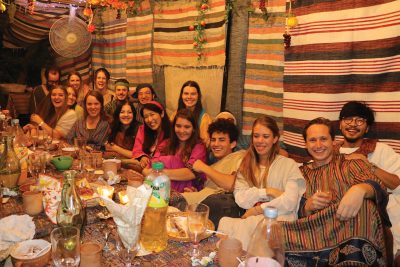×


We have detected your country as:
Please click here to go to the USA website or select another country from the dropdown list.
 Sukkot (Feast of Tabernacles) commemorates the 40 years Israel wandered the desert en route to the Promised Land, living in temporary huts, or sukkot—with nothing but the faithfulness of God to provide for their daily necessities in a barren wilderness.
Sukkot (Feast of Tabernacles) commemorates the 40 years Israel wandered the desert en route to the Promised Land, living in temporary huts, or sukkot—with nothing but the faithfulness of God to provide for their daily necessities in a barren wilderness.
Today, their descendants celebrate Sukkot according to God’s command, “You shall dwell in booths for seven days…that your generations may know that I made the children of Israel dwell in booths when I brought them out of the land of Egypt…” (Lev. 23:42–43).
In Jewish tradition, Sukkot is known as “The Season of Our Rejoicing,” a nod to God’s instruction to spend the feast in jubilation before Him (Lev. 23:40). Joy is thus a decision rather than a fleeting emotion. Moreover, Israel celebrates that God is their only source of joy, love, provision and protection. The God who met their ancestors’ every need as they wandered the wilderness is the same God who continues to care for Israel today.
We’ve asked a few of our Jewish friends to share what Sukkot means to them.
“In our liturgy, Sukkot is called ‘our time of joy.’ We celebrate this sacred holiday by living in temporary housing called a sukkah—three walls and a bamboo rooftop. It represents a joyous faith in living with uncertainty. Celebrating Sukkot in a reborn Israel, with all the uncertainty that surrounds our borders, is a living embodiment that our spirit can never be broken and our hope can never be extinguished.”
—Rabbi David Nekrutman, executive director for the Ohr Torah Stone Center for Jewish–Christian Understanding and Cooperation
“Sukkot symbolizes being covered with an awning. God shows how He sends His awning to us, even when we are not in a safe place. We go out and leave our homes to be in a place where we trust only God’s awning, His protection, over us. In Hebrew the word lesachech means to purify something, to make it softer and more beautiful. This is what God does on Sukkot. He sends us out from our safe homes, He purifies us, softens us so that we can see better how He takes care of us, how He protects us—because we are His children.”
—Esther Weiss, owner of Esther’s Gallery, Hurva Square, Jewish Quarter in the Old City of Jerusalem
“Sukkot is full of meaningful symbolism and biblical commandments that are special and spiritual anywhere, but all the more so in Israel. One of the things that is most symbolic is the temporary nature of the sukkah itself as a dwelling, both because of the materials with which a sukkah is constructed and the fact that it’s only a weeklong festival, drawing parallels to life being temporary as well. In Israel, the paradox of temporary-ness coexists with permanence, the beginning of the return of the Jewish people to the land of Israel from a biblical exile, to the fact that we observe it in the land, generations into our restoration home as a precursor for our final redemption.”
—Jonathan Feldstein, president, Genesis 123 Foundation
“For me, Sukkot means that everything made by human beings is temporary, so we should appreciate everything and everyone around us every day.”
—Steve Linde, editor-in-chief of the Jerusalem Report
“Sukkot is a time to gather in the blessings from above, both the fruits of the land of Israel as well as the fruits of higher consciousness, all designed to bring the world to greater level of unity and revelation of Hashem.”
—Baruch Erdstein, Torah scholar/student, farmer living in Itamar
“Sukkot…is the holiday when I can and do completely immerse myself into a mitzvah (commandment). My whole body enters a sukkah. All our meals are taken there. We entertain there. It is a complete or full mitzvah in that sense and explains perhaps what a Jew is: total commitment to one’s religion, heritage, culture and social community. God and our history surround us an all sides, up, down and around. What a wonderful feeling.”
—Yisrael Medad, journalist, author
“For me Sukkot is a time to get out of the routine. We leave our sheltered homes and our regular habits behind and go out to a temporary home. We confront and accept a reality different from the one we are used to. It is a time of…unity within the people of Israel and a time when we accept and unite with all the other nations of the world under the protection of G-d.”
—Shmuel Drai, director of Keren Shemesh, an NGO providing mentorship to young entrepreneurs
“There is a connection between Pesach [Passover] and Sukkot. Sukkot celebrates the time when the Israelites lived in the desert when they left Egypt and came to Israel. Personally, because I wasn’t born here and made aliyah [immigration to Israel], I consider myself to have come out of Egypt. Therefore, this holiday is so special to me.”
—Silvio Pinco, IT consultant for Palron
Photo Credit: Henry Strauss/bridgesforpeace.com
All logos and trademarks in this site are property of their respective owner. All other materials are property of Bridges for Peace. Copyright © 2024.
Website Site Design by J-Town Internet Services Ltd. - Based in Jerusalem and Serving the World.